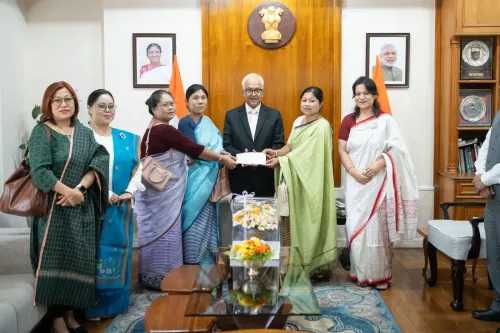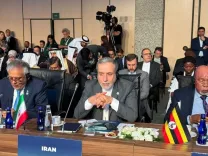Did Punjab Government Provide Lavish Homes to AAP Leaders?

Synopsis
Key Takeaways
- Swati Maliwal accuses AAP leaders of misusing government properties.
- The term “Sheesh Mahal 2.0” refers to the alleged opulence in Punjab.
- Concerns over ethical governance are at the forefront of the debate.
- Public trust in political leaders could be jeopardized.
- Continued scrutiny of AAP's actions is likely to persist.
New Delhi, Nov 1 (NationPress) Rajya Sabha MP Swati Maliwal has intensified her critique of former Delhi Chief Minister Arvind Kejriwal and the Aam Aadmi Party (AAP), asserting that a new “Sheeshmahal 2.0” has emerged in Punjab due to the extravagant use of government properties.
In a series of posts on her official X account on Saturday, Maliwal alleged that a vast seven-star bungalow located in Chandigarh’s Sector 2, covering two acres and designated for the Punjab Chief Minister, has been assigned to Kejriwal.
She further claimed that two other luxurious bungalows in Sector 39 -- No 960 for former Delhi Deputy Chief Minister Manish Sisodia and No 926 for ex-minister Satyendar Jain -- have also been provided for AAP leaders who have moved from Delhi.
“Utilizing government property is a crime,” Maliwal asserted, accusing the Punjab government of granting similar lavish accommodations to many Delhi-based AAP officials now residing in Chandigarh.
She added that Kejriwal was transported from the bungalow complex to Ambala in a government helicopter before taking a Punjab government private jet to Gujarat for party matters.
"The entire Punjab government now caters to one individual," she commented sarcastically.
This marks yet another direct attack from Swati Maliwal.
On Friday, she claimed that following the exit from the controversial "Sheesh Mahal" in Delhi -- the former official residence renovated at a staggering cost, which drew significant backlash for extravagance and corruption -- Arvind Kejriwal has established an even more opulent version in Punjab.
The original Sheesh Mahal controversy erupted when details surfaced regarding lavish renovations to Kejriwal's Delhi residence, leading to sharp criticism from the Opposition.
The Opposition has labeled the AAP government as a representation of hypocrisy and ostentatious governance.
Maliwal, who previously served as the chairperson of the Delhi Commission for Women and was once a close ally of AAP, has increasingly taken a stance as a vocal critic of the party leadership since her contentious departure.









